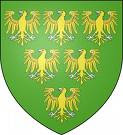This is the book I've been waiting for from Kathryn Warner for a long, long time! I'm sorry it's taken me some time to post this review, but I've had a very busy summer and am only now getting round to posting it. I've been a longtime fan of Kathryn Warner's Edward II blog and have been intrigued by the possible survival of Edward II. The sheer number of books about Richard III and the disappearance of his nephews has dominated royal mysteries for years. We'll never, ever know what happened, and in my opinion, it's obvious Richard had them killed to ensure his survival. But the mystery of Edward II's supposed survival has far more evidence than any you can find on the mystery of the Princes. Edward's possible survival needs far more attention than it's been given - and Kathryn does so in her marvelous book. Biographies of Edward focus on his weaknesses and his tyranny, and any reference to his survival is quickly brushed over, usually dismissed, and even if not, deemed as unworthy of further investigation. But it's a fascinating possibility, and anyone who likes a good detective story will find it here. I won't give a way too much, but for me the most intriguing parts of the story are -
- that such a personage as the Archbishop of York, Melton, someone who knew Edward, was utterly convinced Edward was a live. An intelligent and powerful man was willing to commit to paper his belief that Edward was still alive and wanted to raise money to gather support for Edward.
- the whole plot to 'entrap' the Earl of Kent, who believed his brother to be alive and was trying to gather support for him. Why would Roger Mortimer and Isabella, having given out the news that Edward was dead, seek to 'entrap' Kent into believing his brother was alive? Surely the last thing they would want was any speculation that Edward was alive?
- We're not told what killed Edward at Berkeley Castle. From being in good health, and we have evidence he was treated well in captivity, and with descriptions of him being strong and no sign of poor health, what exactly did he die of?
- Whatever killed Edward, his body was never put on public view. Think of when Henry VII paraded the body of the defeated Richard III, and how Edward IV and Richard put the bodies of Henry VI and Warwick the Kingmaker on view to prove they were dead. Interestingly, it's the first royal funeral to use a wooden effigy.
- The Fieschi letter. I've read and re-read it so many times, and it's fascinating. Is it a fake? and if so, why would anyone want to fake it? What would there be to gain? If it was genuinely written by Fieschi and is a 'blackmail' attempt by the Papacy - it's a pretty flimsy attempt. If Edward III ever received it as such, it seemingly had no effect. There is one detail in particular that Kathryn has linked with her research - and I won't say what it is - but it certainly lends weight to the Fieschi letter being genuine.
- Key for me for the survival of Edward is his attitude to the crown. In my opinion, he didn't want his crown back. He knew he was unpopular, and I'm sure he wouldn't have wanted a Civil war for his son, so what better than to surrender his person into the hands of the papacy and live a simple life as a hermit?
This is a thought-provoking book and I literally could not put it down - constantly referring back to it and re-reading passages again and again.



